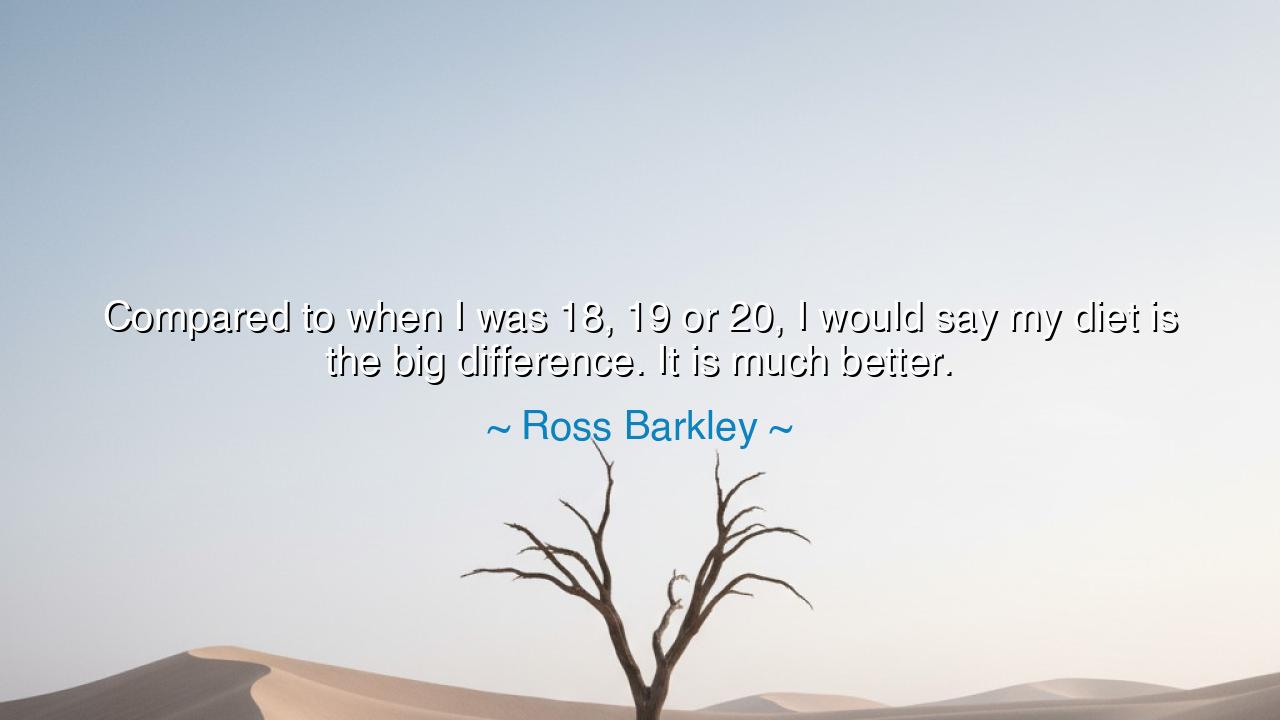
Compared to when I was 18, 19 or 20, I would say my diet is the
Compared to when I was 18, 19 or 20, I would say my diet is the big difference. It is much better.






The words of Ross Barkley—“Compared to when I was 18, 19 or 20, I would say my diet is the big difference. It is much better”—are simple in form, yet profound in meaning. Beneath their modest surface lies a truth that transcends the realm of sport and speaks to the universal journey of growth, discipline, and self-awareness. Barkley, once a young athlete brimming with raw energy, now speaks with the tempered wisdom of experience. His reflection is not merely about food or fitness—it is about the transformation that comes when a man learns to master himself, when he replaces impulse with intention, and carelessness with craft.
In his youth, as with many, Barkley lived under the illusion that strength alone was enough, that youth itself could sustain greatness. The body, fresh and forgiving, seems invincible in those early years. But time, as the ancients knew, is the truest teacher. It reveals that vitality without wisdom is fleeting, that passion without balance burns itself away. When Barkley speaks of his better diet, he speaks of more than nourishment—he speaks of discipline, of the understanding that greatness demands harmony between body and mind.
The origin of this truth can be traced through the history of all who have sought mastery in any art. The Greek athletes of Olympia, though famed for their strength, were also students of restraint. They trained their bodies not only in muscle but in moderation. The philosopher Pythagoras taught that the body, when purified by balance in diet and thought, becomes the vessel of wisdom. Likewise, Barkley’s reflection mirrors this ancient belief—that what we consume, both in body and spirit, shapes what we become. A man’s diet is not only food—it is his habits, his choices, and the thoughts he allows to feed his soul.
Consider the example of Alexander the Great, whose youthful vigor led him to conquer vast empires before his thirtieth year. Yet his tutor, the philosopher Aristotle, warned him that without self-discipline, even the greatest victories would crumble from within. And indeed, Alexander’s boundless energy eventually turned to excess—his feasts grew grander, his rest shorter, and his body faltered under the weight of his ambition. His downfall was not from the sword of an enemy, but from his failure to sustain balance. In this, Barkley’s simple admission stands as an echo of ancient wisdom: that true greatness is not achieved by conquest alone, but by mastery over oneself.
To say “my diet is much better” is, in essence, to say, I have learned to respect the vessel that carries me through life. For the body is both temple and teacher—it rewards care and punishes neglect. As Barkley matured, he came to see that performance is not born solely from effort, but from harmony—the synchronization of mind, body, and will. This shift from indulgence to awareness marks the threshold between youth and manhood, between potential and realization. It is the moment when one ceases to chase strength blindly and begins to cultivate it wisely.
His words, though modest, carry the quiet dignity of transformation. Many spend their lives trapped in the habits of their youth—seeking comfort instead of purpose, pleasure instead of progress. But those who rise, like Barkley, learn the sacred art of refinement. They understand that improvement is not a single leap, but a series of small, deliberate choices—a better meal here, an earlier night there, a quieter mind each morning. This is the true meaning of evolution: not the abandonment of what one was, but the cultivation of what one is meant to be.
Let this be the lesson carried forward: self-mastery begins with self-care. The body is not a servant to be driven into exhaustion, but a partner to be honored. Feed it well—not only with food, but with discipline, rest, and gratitude. Do not mistake youth’s energy for wisdom’s endurance, for the former fades quickly without the latter. In every field of endeavor—sport, art, or life itself—excellence belongs not to the reckless, but to the disciplined, those who live with awareness and act with intention.
So remember the quiet truth in Ross Barkley’s reflection. It is not about diet alone, but about awakening to the responsibility of greatness. Each of us, as we grow, must learn to refine our lives as an athlete refines his craft—to strip away the excess, to nourish what matters, and to align strength with purpose. For in that balance lies not only health, but mastery, and in mastery, the power to live fully, wisely, and well.






AAdministratorAdministrator
Welcome, honored guests. Please leave a comment, we will respond soon